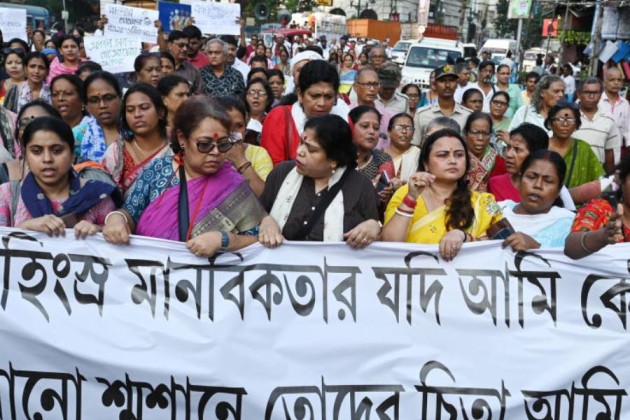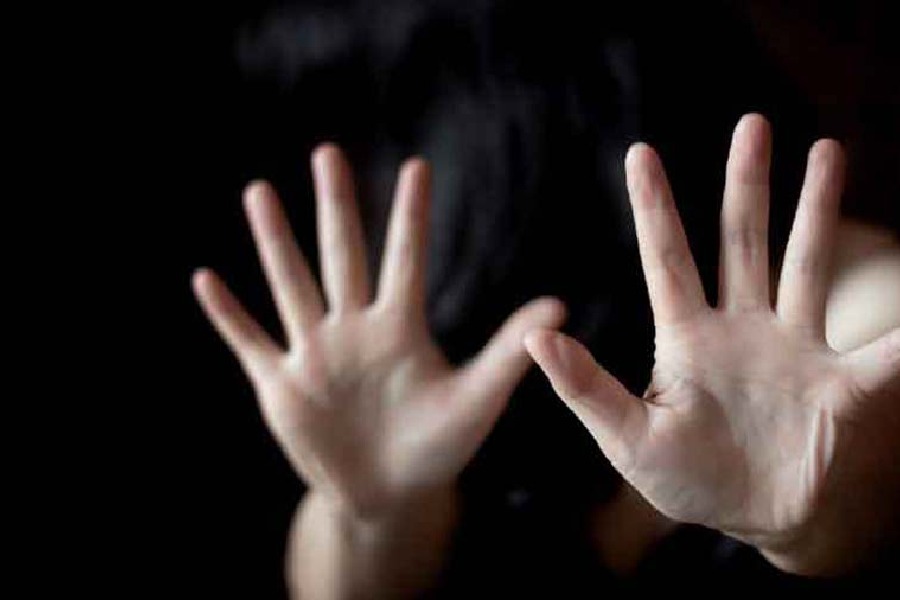Protesters from Kamduni took out an emotionally charged march in Calcutta on Tuesday to express disappointment with Friday’s high court judgment on the rape of the 21-year-old woman from the village a decade ago.
They were joined by political activists, mainly from the CPM and its women’s wing, the Ganatantrik Mahila Samity, and the Congress, and sympathisers from the city and elsewhere. In Kamduni, about 20km from Calcutta, BJP leader Subhendu Adhikari held a parallel march with women protesters and the BJP Mahila Morcha.
The Calcutta march from Dharmatala to the Gandhi statue at Maidan was led by Tumpa Koyal, Moushumi Koyal and Pradip Mukherjee, who have always been at the forefront of the Kamduni protests. Angry rhetoric filled Park Street for a while. Shouting slogans, the protesters cried for “justice” and “fitting punishment” for the offenders.
A large banner at the front metaphorically quoted Sukanta Bhattacharya’s lines from the poem Bodhon: “Aadim hingsro manabikatar jodi ami keu hoi/ Swajan harano shoshane toder/ Chita ami tulboi (If I bear any relation to the primal savage human impulse, I will light your pyres in the burning ground where I have lost my own).”
On June 7, 2013, the 21-year-old, a college student and a first-generation learner, had been grabbed in daylight near the Kamduni crossing, raped and murdered.
During the march, Tumpa, the murdered girl’s friend from childhood, was so overcome with emotion that she collapsed midway and had to be taken away in an ambulance. She had been breaking down repeatedly earlier, dismayed by the Calcutta High Court judgment that had reduced the sentences given earlier by a lower court against the accused.
“We had really hoped that the high court would uphold the lower court sentences. Our hopes were shattered,” Tumpa said. “But we will fight till the end, taking our battle to the Supreme Court,” she added.
Moushumi, too, reacted emotionally, tears coursing down her cheeks. “Where is the justice? We have to march in the streets because we didn’t get justice,” she said.
The lower court had awarded death sentences to three of the accused. The high court on Friday, citing the evidence given by the prosecution, issued a judgment that acquitted one of the accused who had been given the death sentence, commuted the death sentence of two others to life imprisonment and reduced the life sentences of the remaining three accused to seven-year terms. Since the last three had already spent 10 years behind bars, the court said they could be free. The judgment, in effect, allowed four of the accused to walk free.
The protesters feel that for a crime of such magnitude as the rape of the college girl, no offender should be freed. A section of the protesters, however, said that the problem was specifically with the processes of investigation and prosecution. The court had to go by the evidence it received from the investigating agencies, a protester said.
Mukherjee, the former schoolteacher who has been part of the protests and had taken the lead in forming the Kamduni Pratibadi Mancha, the forum under which the protesters had united earlier, pointed out that the forum had been complaining from the beginning that the investigating agencies were not doing their job and were trying to protect the guilty. “Evidence was being tampered with and witnesses were bought,” he said. “No one listened to our demand for a better investigation,” he said.
Late on Friday, the day of the judgment, CID officials representing the Bengal government had met the Kamduni protesters in the village, assured them of all support and promised to make a separate appeal to the Supreme Court against the high court verdict. The state government has now appealed to the Supreme Court, which has agreed to examine the plea.
“I wish the state government had extended us this support 10 years ago,” Tumpa said on Tuesday, crying. The protesters want to meet the Prime Minister and the President with their demand for justice.
On the day of the judgment, the Bengal BJP leadership had said that the party would extend all help to see that justice is delivered in the Kamduni case.
A civil society member present at the march, however, expressed his apprehensions. The demand for justice should not be synonymous with the demand for a death sentence, he said. He is also afraid, he added, of the fact that different political parties are trying to appropriate the Kamduni protests, which, still, essentially remain a people’s movement.
Leaders from the CPM and Congress, young and old, were present at the Calcutta march, including Tarit Topdar and Ramola Chakraborty from the CPM and Pradip Bhattacharya and Kaustov Bagchi from the Congress.












